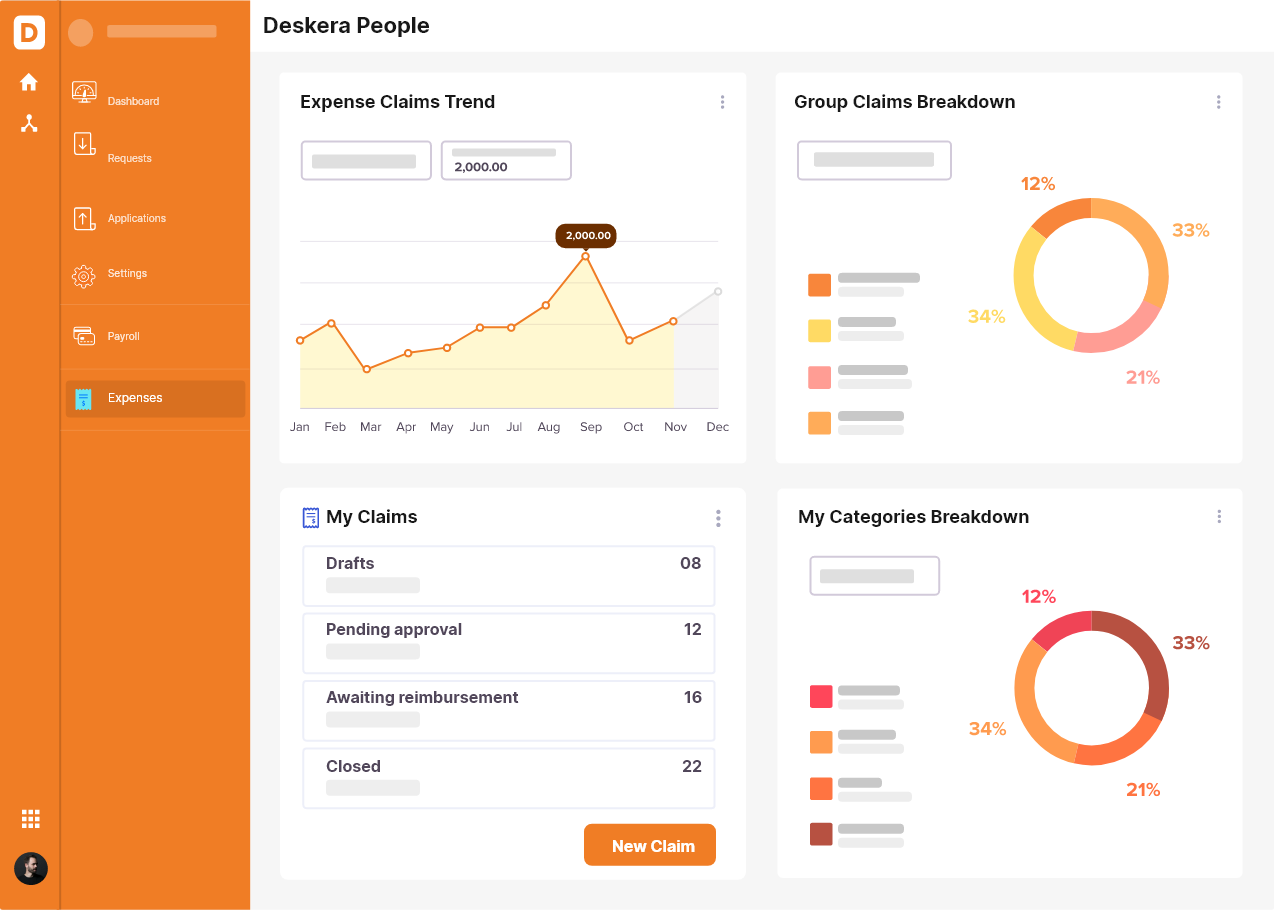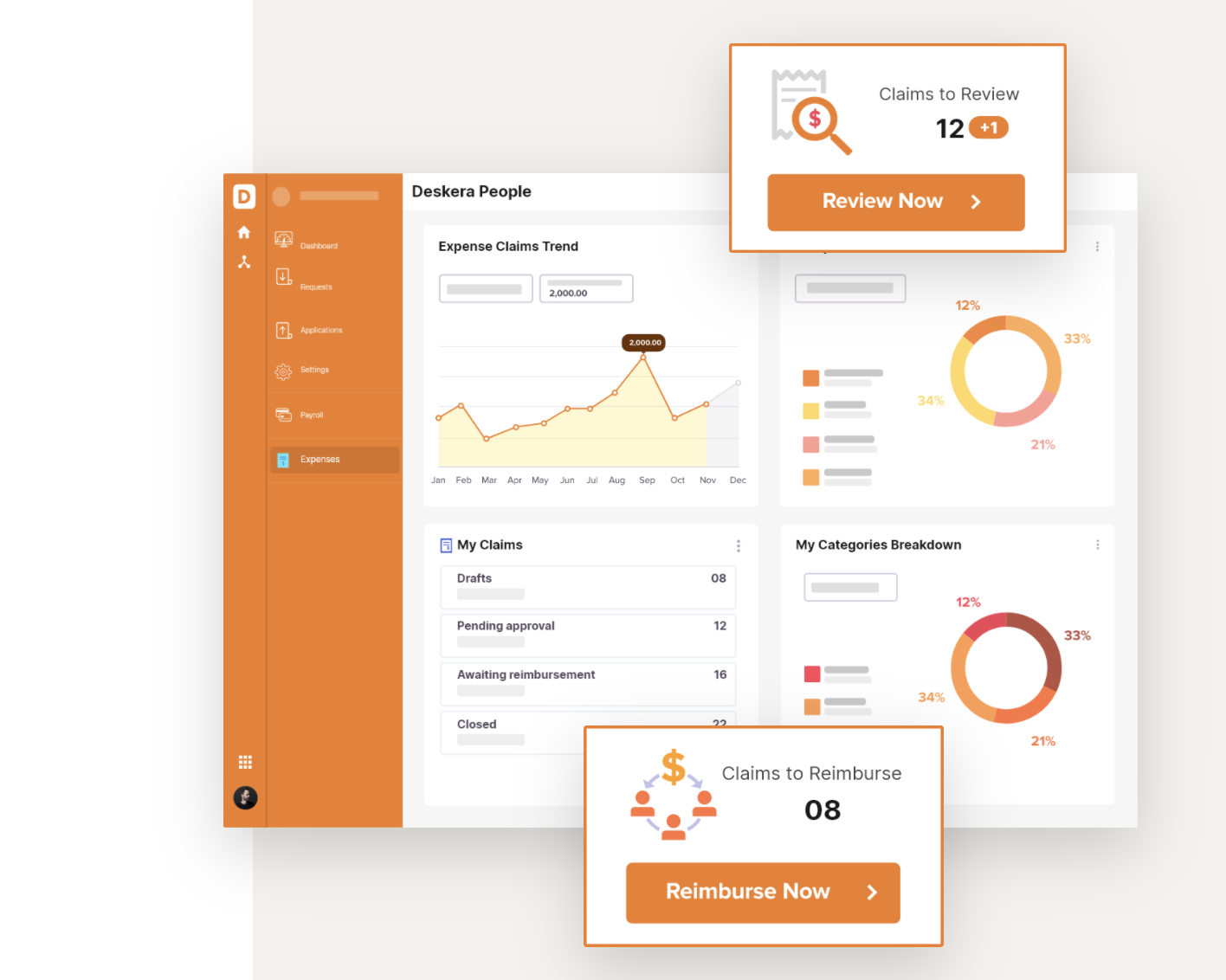Index
- What is Expense Reimbursement?
- What is an Expense Reimbursement Policy?
- What kind of expenses require an employer to reimburse employees?
- Why do businesses need expense reimbursement policies? How can they prevent expense reimbursement frauds?
- Setting up an expense reimbursement policy
- So, what now?
What is Expense Reimbursement?
Every business - large, medium, or small - inevitably has expenses that impact its taxable income. Often, it’s the employees, that bear these business-related expenses on behalf of the company, and that’s where expense reimbursement comes into play.
Employees incur business-related expenses in the interest of work, for reasons ranging from lack of clear support to actual, evolved policies on expensing that dictate such activities. Work-related travel, supplies, equipment, and many other work-specific activities, involve companies righteously (and legally) compensating employees for their expenses. Generally, these payments are so structured that employees aren’t required to report these compensations as their income or wages. Therefore expense reimbursements don’t count as taxable income.
What is an Expense Reimbursement Policy?
While companies are bound to pay employees who incur business-related expenses with their own money, this by no means permits employees to hold the enterprise responsible for every payment. This is dictated by a tangible set of rules regarding expense reimbursement, or an expense reimbursement policy. Such policies dictate the variety, cost range, timeline, and other important factors behind employee reimbursements. Which brings us to our next point:
What Kind of Expenses Require an Employer to Reimburse Employees?
The very first thing that needs to be made clear: expenses to be reimbursed should be purely business-related. Here, we are taking a broader look into some categories of expenses that would require you, the employer, to reimburse your employees, but keep in mind every company’s situation is unique. Therefore the expenses that require reimbursement may vary accordingly. Ultimately, it’s the businesses that decide the expenses they’ll be reimbursing.
- Travel:
Travel for business involves several payments and is considered one of the primary activities that require expense reimbursements. Valid expenses include:
- The sum payable for traveling by flight/other modes of transport
- Accommodation expenses at the destination
- Meals
- Costs for public transportation/taxi services as per requirements
- Visas or other documentation required for international travel
Except for these common expenses, employees may also be reimbursed for the use of their personal vehicles for business purposes at a standard rate.
- Communications:
If employees are required to constantly travel and visit different locations for their job, or if their job involves many phone calls (like in sales), businesses would want to ensure they’re always accessible. It’s in the company’s best interests to pay for employees’ cellular plans.
- Supplies and Other Expenses:
Businesses would naturally desire their employees to have access to tools and supplies that enable an optimal work environment. Updating their devices to newer models and replacing other equipment should be included as valid expenses in an expense reimbursement policy.
- Additional Transport:
As mentioned above, transport expenses during a business trip are for the company to cover. But what about additional transport expenses, like when the employee uses public transportation/cabs to commute, or even their own car?
While many companies consider reimbursing employees for these costs as well, it solely depends on the business to decide whether or not to sponsor those expenses, based on their internal policies.
- Additional Meals and Entertainment:
Again, the company should certainly pay employees for boarding and a moderate amount of entertainment during a work trip. And if their job requires taking a client out to eat or for networking experiences, those should be considered valid for reimbursements too.
Why do Businesses Need Expense Reimbursement Policies? How Can They Prevent Expense Reimbursement Frauds?
In the early days as a small business, setting up an expense reimbursement policy might seem like a distant priority. But it’s critical to plan ahead and simulate future scenarios and avoid potential issues, when multiple employees may be required to spend their money in the interest of the business.
Running a successful business is exorbitantly challenging, even more so when you count in all those additional costs of equipment, transportation, travel, etc. A business, especially a small or medium-sized business, must keep a tab of all employee expenses. This consumes precious time and involves a herculean effort, and that’s precisely where a well-crafted expense reimbursement policy comes in.
Without an expense reimbursement policy, employees lack clarity on how much they are permitted to spend on purchases on account of the company. Nor do they know whether the purchases are even reimbursable. This might result in multiple phone calls with the finance team with no real fix on the ambiguities. The solution to this otherwise unavoidable chaos is a set of rules addressing the dos and don’ts for your employees to refer to.
Since an expense reimbursement policy transparently catalogs every expense that an employee may get reimbursed for and also lays down procedures on reporting these expenses, it’s the ultimate guide concerning both reimbursement and expense reporting. With it, employees can be rest assured that they are not, in fact, making business payments out of their salaries. It also makes the entire expense reimbursement process a whole lot easier for the folks in charge. Ultimately, everyone gets to go home happy.
Perhaps most importantly, a solid expense reimbursement policy lends the maximum possible security against reimbursement frauds. Since frauds regarding expense reports are a challenge many businesses have been known to face, it’s essential to consider preventive measures.
An expense reimbursement policy that is loosely constructed and has loopholes makes it easier for bad actors to exaggerate expenses or, even worse, conjure false records.
On the other hand, a carefully constructed expense reimbursement policy ensures employees understand how to control expenses, when to share their expense reports, and the consequences that come with policy violations.
Setting up an Expense Reimbursement Policy
Now that we know why an expense reimbursement policy is essential for a business, let’s take a look at how to come up with a simple but effective expense reimbursement policy:
Explain the Expense Reimbursement Procedures and the Different Expense Categories:
Very clearly outline the entire reimbursement process. Employees must be aware of the hows and whats, the various categories, and limits of expenses reimbursements.
Thoroughly Explain the Expense Reporting Process:
How and when employees submit their expense reports and the proofs, deserve an examination in minute detail, since this is where most company expense policies exhibit loopholes and ambiguities.
List the receipts/invoices/other proofs of transactions required, mention time limits within for reporting reimbursable expenses, and for payments to be processed.
Keep it Short and Comprehensible:
A long and unnecessarily detailed set of rules isn’t helpful. Take special care to use simple language with clear instructions.
Regularly Update Your Policies:
Keeping pace with the changing times, policies need timely adjustments too. For example, when companies first set up expense reimbursement policies, they listed physical receipts as required proof for expense reporting. In today’s times, e-receipts should work, and policies must reflect this.
Also, do check out all the regional and/or national laws that concern your policies.

Make Use of Technology
Integrate virtual expense management tools and accounting software with your company’s expense management and reimbursement system. This saves your employees considerable time and energy, relieves the finance management team from the frustrating task of manually auditing expenses, and ensures the overall data accuracy.
So, What Now?
With an expense reimbursement policy perfectly suited to your company, what’s the next step? This is where expense management software comes into play.

Manually tracking all data on employee expenses is a quite harrowing job and an inefficient use of resources. To save your team the whole nine yards’ worth of trouble, check out Deskera People. Deskera audits expenses and claims in real-time and reports reimbursed expenses simultaneously.
An essential tool for your HR stack, Deskera People also checks for policy violations, valid proofs, duplicate submissions, and more! For example, if an employee reports an expenses sum greater than the company policy allows them to, the software immediately alerts both you and the employee to the violation of the rules.
The software ensures 100% security of all data it handles, minimizes chances of frauds to almost zero, and makes sure nothing gets past you. We do hope you'll find it of use!










